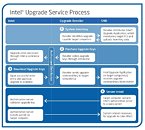Monday, September 20th 2010

Intel Wants $50 for Software Unlock of CPU Features
The Pentium G6951 dual-core LGA1156 processor may not have made any headlines when it was known to be almost identical to the Pentium G6950, until now. Intel designed the G6951 to support "hardware feature upgrades" by purchasing them and enabling them using a software, so users with this processor installed can upgrade their systems by enabling that are otherwise locked for the SKU. The $50 upgrade fetches support for HyperThreading Technology, enabling four threads on the processor; and unlocks the disabled 1 MB of the L3 cache (Clarkdale has 4 MB of L3 cache, of which 1 MB is disabled on the Pentium SKUs).
There isn't much value in buying a $99 Pentium G6951 and the $50 Upgrade Card upfront, but later down the line, companies can opt to mass-upgrade system performance without touching any of the hardware inside. The service works by the purchase of an upgrade key that the user has to feed into the software, which is then verified by Intel's activation server, following successful verification, the software unlocks the processor's features. This is a one-time process, portable between software reinstallations.
There isn't much value in buying a $99 Pentium G6951 and the $50 Upgrade Card upfront, but later down the line, companies can opt to mass-upgrade system performance without touching any of the hardware inside. The service works by the purchase of an upgrade key that the user has to feed into the software, which is then verified by Intel's activation server, following successful verification, the software unlocks the processor's features. This is a one-time process, portable between software reinstallations.

160 Comments on Intel Wants $50 for Software Unlock of CPU Features
NT's first response described a good scenario where Intel can price gouge this one and I'm 100% sure they will, for all its worth.
Anyway for me, it's not just about the price: it just feels wrong. Basically, Intel is holding the processor that you paid for to ransom for more money, which doesn't seem right to me.
I think also that it could lead to stagnation in new hardware with genuine performance improvements held back by this. You can just see Intel and AMD "competing" in the marketplace by incrementally enabling more performance in their current chips until they are fully unlocked and only then making new designs. Sounds like it would stifle real competition and innovation, doesn't it?
Nah, it's one thing to speed bin chips and permanently disable parts of them to make useable lower grades and quite another to intentionally cripple them for more money. Think about it, using Intel's new strategy, what happens to the slightly defective chips that could have lived life as a lower grade CPU with less cache or something? They would get discarded and we all end up paying higher prices so that Intel can make a profit in only selling fully functional, but "locked" CPUs.
And finally, as I suggested before, there have been lots of angles discussed on this thread and I think it's well worth reading them and not just taking the narrow view of price into consideration.
They haven't changed anything at all, they have always intentionally crippled parts. Both AMD and Intel (and IBM, and nVidia, and ATI, and Matrox, etc., etc.) have done this from day one. Everybody seems to be missing this point. That point completely nullifies the anti-crippling argument. The only difference here is, Intel now gives the customer the choice to unlock, if they see fit.
If you don't unlock it, you still paid the proper price for the performance level of the chip. You got exactly what you paid for. You have not been ripped off in any way, shape or form. They are not obligated to give you a better performing part for less money.
All that said, I think the unlock costs too much for the performance boost.
And price and value are the only arguments that have had any merit in this thread.
Ultimately, I think this new practice is a bit of a grey area and there are lots of valid angles, including yours.
As I said to Wile E, this is a grey area and I think the best decider of whether this is good or bad, will be if it takes off and we see the actual results of this marketing strategy.